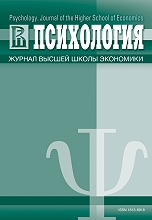Продуктивность диалогичного отношения Я – Другой
Ключевые слова:
Я, Другой, отношение, диалог, творчество, продуктивность, другие, культура, герменевтика, модель, рефлексия
Аннотация
В статье представлены результаты применения методов герменевтики, теоретической реконструкции и моделирования при исследовании проблемы многоаспектной продуктивности отношения личности к Другому. На основе герменевтического анализа и синтеза релевантных идей С.Л. Рубинштейна, М.М. Бахтина, М. Бубера, П. Тиллиха, М. Мерло-Понти, Д. Винникотта, Ж. Лакана, Г. Херманса впервые эксплицированы критерии продуктивности отношения Я – Другой в связи с его диалогичностью: многоплановость Я, вовлеченного в отношение; реальное взаимодействие Я и Другого, повышающее телесные возможности каждого; диалогичность отношения, предполагающая взаимодействие «между», активность Я в-Другом, данность Другого в-Я, обращенность Я к себе;; рефлексивность Я при реализации диалогичного отношения к Другому; множественность «Других», вовлеченных в отношение Я к конкретному другому человеку; ценностный характер отношения Я к Другому; сложная психологическая структура отношения; раскрытие и согласование потенциалов сознания и бессознательного в отношении; творческая активность Я, направленная на Другого, себя, объекты в контексте культуры; знание и конструктивное разрешение противоречий отношения; позитивные изменения Я и Другого в динамике диалогичного отношения; создание и обновление объектов, вовлеченных в отношение; расширение диапазона и повышение качества связей Я со многими другими людьми как эффект диалогичного отношения к Другому; полнота субъективного проживания и саморазвитие Я в отношении к Другому – становление «диалогического Я»; создание «текстов Я», адресованных Другому и другим (исповедей, жизнеописаний, устных нарративов и т.д.); авторские вклады личности в культуру как субъекта отношения к Другому. С учетом выделенных критериев разработана теоретическая модель продуктивного отношения Я – Другой, объединяющая диалогичные Я-позиции личности в «измерениях» Между-Я-и-Другим, Я-в-Другом, Другой-в-Я, Я-в-себе-с-Другим. Модель представляет собой содержательно-операциональную основу для создания новых рефлексивных техник, которые могут иметь форму интервью, опросника, методики самопознания, техники самоисследования, нарратива. Новизна авторского подхода состоит в раскрытии и детальном обосновании связи продуктивности и диалогичности отношения Я - Другой, которая в генезе, многосторонности, конструктивных эффектах не освещена с достаточной полнотой в философско-психологической классике, современных исследованиях и практических разработках.Скачивания
Данные скачивания пока не доступны.
Литература
1. Бахтин, М. М. (1986). Эстетика словесного творчества. М.: Искусство.
2. Бубер, М. (1993). Я и Ты. М.: Высшая школа.
3. Бубер, М. (1995). Два образа веры. М.: Республика.
4. Винникотт, Д. (2002). Игра и реальность. М.: Институт общегуманитарных исследований.
5. Лакан, Ж. (1999). Стадия зеркала и ее роль в формировании функции Я. М.: Логос.
6. Лакан, Ж. (2009). «Я» в теории Фрейда и технике психоанализа. М.: Гнозис.
7. Левинас, Э. (1998). Время и Другой. СПб.: Высшая религиозно-философская школа.
8. Мамардашвили, М. К. (1997). Психологическая топология пути. СПб.: РХГИ.
9. Мерло-Понти, М. (1992). Око и Дух. М.: Искусство.
10. Мерло-Понти, М. (1999). Феноменология восприятия. СПб.: Ювента.
11. Петровский, В. А. (2013). «Я» в персонологической перспективе. М.: Издательский дом НИУ ВШЭ.
12. Петровский, В.А., Старовойтенко, Е.Б. (2012). Наука личности: четыре проекта общей персонологии. Психология. Журнал Высшей школы экономики, 9(1), 21-39.
13. Рикер, П. (2008). Я-сам как другой. М.: Изд-во гуманитарной литературы.
14. Рубинштейн, С. Л. (1973). Проблемы общей психологии. М.: Просвещение.
15. Cартр, Ж.-П. (2002). Бытие и ничто. Опыт феноменологической онтологии. М.: ТЕРРА-Книжный клуб: Республика.
16. Старовойтенко, Е. Б. (2013а). Возможности Я в диалоге с Другим. Мир психологии, 4, 189-204.
17. Старовойтенко, Е. Б. (2013б). Возможности Я в отношении к Другому: герменевтика и рефлексия. Психология. Журнал Высшей школы экономики, 10(4), 121-143.
18. Старовойтенко, Е.Б. (2013в). Достижение себя в отношении к Другому. Мир психологии, 2, 71-85.
19. Старовойтенко, Е. Б. (2015). Персонология: жизнь личности в культуре.М.: Академический проект.
20. Старовойтенко, Е. Б. (2016). Генез Я в отношении к Другому. В кн. М. И. Воловикова, А. Л.
21. Журавлев, Н. Е. Харламенкова (ред.), Психологические исследования личности: история, современное состояние, перспективы(с. 117-135). М.: Изд-во «Институт психологии РАН».
22. Тиллих, П. (1998). Систематическое богословие. СПб.: Алетейя.
23. Тиллих, П. (2011). Мужество быть. М.: Модерн.
24. Шекспир, У. (2010). Сонеты. М.: ОЛМА Медиа Групп.
2. Бубер, М. (1993). Я и Ты. М.: Высшая школа.
3. Бубер, М. (1995). Два образа веры. М.: Республика.
4. Винникотт, Д. (2002). Игра и реальность. М.: Институт общегуманитарных исследований.
5. Лакан, Ж. (1999). Стадия зеркала и ее роль в формировании функции Я. М.: Логос.
6. Лакан, Ж. (2009). «Я» в теории Фрейда и технике психоанализа. М.: Гнозис.
7. Левинас, Э. (1998). Время и Другой. СПб.: Высшая религиозно-философская школа.
8. Мамардашвили, М. К. (1997). Психологическая топология пути. СПб.: РХГИ.
9. Мерло-Понти, М. (1992). Око и Дух. М.: Искусство.
10. Мерло-Понти, М. (1999). Феноменология восприятия. СПб.: Ювента.
11. Петровский, В. А. (2013). «Я» в персонологической перспективе. М.: Издательский дом НИУ ВШЭ.
12. Петровский, В.А., Старовойтенко, Е.Б. (2012). Наука личности: четыре проекта общей персонологии. Психология. Журнал Высшей школы экономики, 9(1), 21-39.
13. Рикер, П. (2008). Я-сам как другой. М.: Изд-во гуманитарной литературы.
14. Рубинштейн, С. Л. (1973). Проблемы общей психологии. М.: Просвещение.
15. Cартр, Ж.-П. (2002). Бытие и ничто. Опыт феноменологической онтологии. М.: ТЕРРА-Книжный клуб: Республика.
16. Старовойтенко, Е. Б. (2013а). Возможности Я в диалоге с Другим. Мир психологии, 4, 189-204.
17. Старовойтенко, Е. Б. (2013б). Возможности Я в отношении к Другому: герменевтика и рефлексия. Психология. Журнал Высшей школы экономики, 10(4), 121-143.
18. Старовойтенко, Е.Б. (2013в). Достижение себя в отношении к Другому. Мир психологии, 2, 71-85.
19. Старовойтенко, Е. Б. (2015). Персонология: жизнь личности в культуре.М.: Академический проект.
20. Старовойтенко, Е. Б. (2016). Генез Я в отношении к Другому. В кн. М. И. Воловикова, А. Л.
21. Журавлев, Н. Е. Харламенкова (ред.), Психологические исследования личности: история, современное состояние, перспективы(с. 117-135). М.: Изд-во «Институт психологии РАН».
22. Тиллих, П. (1998). Систематическое богословие. СПб.: Алетейя.
23. Тиллих, П. (2011). Мужество быть. М.: Модерн.
24. Шекспир, У. (2010). Сонеты. М.: ОЛМА Медиа Групп.
Опубликован
2018-11-03
Как цитировать
СтаровойтенкоЕ. Б. (2018). Продуктивность диалогичного отношения Я – Другой. Психология. Журнал Высшей школы экономики, 14(3), 408-432. https://doi.org/10.17323/1813-8918-2017-3-408-432
Выпуск
Раздел
Общая персонология





